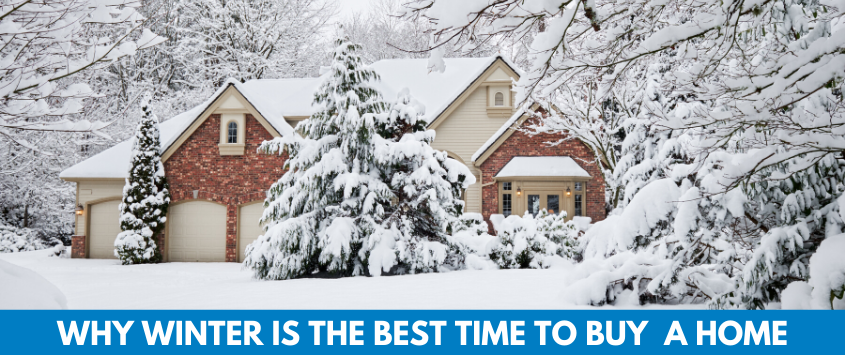Ah, the spring and summer months! Homeowners listing their homes put out the “for sale” signs to take advantage of this seasonal seller’s market. Meanwhile, the warm weather and the end of the school year help to bring out the homebuyers. However, house hunting in December and the subsequent winter months – when the cold winds blow, and snow begins to fall – may actually be the better time to buy. Read on to discover the five reasons why home buying in the winter cold could be the best time to purchase your next home.
Seasonal Priorities
Other priorities take over during the winter months that tend to overshadow house hunting and home buying. These priorities include holiday shopping and preparations, traveling on vacations and staying warm and dry by participating in indoor activities. Given these seasonal priorities, fewer people are actively in the market to find a home as winter approaches. With fewer active buyers, the residential real estate market automatically becomes a buyers’ market in the winter.
Buyers’ Market
Homes listed for sale as winter approaches tend to remain on the residential market for the longest periods of any throughout the year. Homes listed in October and November in most areas can expect to be up for sale as long as 90 to 100+ days in the winter market months of December through March. This stagnant glut of homes listed for an extended period of time also contributes to the buyers’ market.
Value Incentives
When homes sit on the market for sale for a long time (three months or more), sellers begin to get anxious. Worried that their homes won’t sell, sellers will often reduce their asking price or make needed improvements in an effort to attract buyers. These incentives to buyers give them an edge in the home buying market that buyers in the spring and summer months often don’t get.
Occasions for Negotiation
Unfortunately, colder weather tends to bring out some of the worst qualities in pre-owned homes. Problems such as inefficient heating, leaky windows and doors, basement cracks and roof leaks may become more apparent in the winter. These negatives, however, can be used by winter homebuyers as leverage to negotiate the asking price down or to bargain with the seller to make the repair as a condition of purchase.
Faster Financing
Traditional trends show that December is usually the month with the lowest number of mortgage originations. With fewer mortgages to process, lenders may be quicker about issuing their decision on your financing and moving the paperwork along. This will allow you to lock up your deal faster than in the summer months.
Serving more than 5,000 homeowners and homebuyers, Ed Currie is knowledgeable, experienced and results-oriented. Count on the expertise of the finance professionals with Ed Currie to help you. Contact Ed with your specific questions or call 847-214-2404 today. Check us out on Facebook, Twitter, LinkedIn, Pinterest or Instagram for our latest tips and updates!


Ah, the spring and summer months! Homeowners listing their homes put out the “for sale” signs to take advantage of this seasonal seller’s market. Meanwhile, the warm weather and the end of the school year help to bring out the homebuyers. However, house hunting in December and the subsequent winter months – when the cold winds blow, and snow begins to fall – may actually be the better time to buy. Read on to discover the five reasons why home buying in the winter cold could be the best time to purchase your next home.
Seasonal Priorities
Other priorities take over during the winter months that tend to overshadow house hunting and home buying. These priorities include holiday shopping and preparations, traveling on vacations and staying warm and dry by participating in indoor activities. Given these seasonal priorities, fewer people are actively in the market to find a home as winter approaches. With fewer active buyers, the residential real estate market automatically becomes a buyers’ market in the winter.
Buyers’ Market
Homes listed for sale as winter approaches tend to remain on the residential market for the longest periods of any throughout the year. Homes listed in October and November in most areas can expect to be up for sale as long as 90 to 100+ days in the winter market months of December through March. This stagnant glut of homes listed for an extended period of time also contributes to the buyers’ market.
Value Incentives
When homes sit on the market for sale for a long time (three months or more), sellers begin to get anxious. Worried that their homes won’t sell, sellers will often reduce their asking price or make needed improvements in an effort to attract buyers. These incentives to buyers give them an edge in the home buying market that buyers in the spring and summer months often don’t get.
Occasions for Negotiation
Unfortunately, colder weather tends to bring out some of the worst qualities in pre-owned homes. Problems such as inefficient heating, leaky windows and doors, basement cracks and roof leaks may become more apparent in the winter. These negatives, however, can be used by winter homebuyers as leverage to negotiate the asking price down or to bargain with the seller to make the repair as a condition of purchase.
Faster Financing
Traditional trends show that December is usually the month with the lowest number of mortgage originations. With fewer mortgages to process, lenders may be quicker about issuing their decision on your financing and moving the paperwork along. This will allow you to lock up your deal faster than in the summer months.
Serving more than 5,000 homeowners and homebuyers, Ed Currie is knowledgeable, experienced and results-oriented. Count on the expertise of the finance professionals with Ed Currie to help you. Contact Ed with your specific questions or call 847-214-2404 today. Check us out on Facebook, Twitter, LinkedIn, Pinterest or Instagram for our latest tips and updates!





![EdCurrie_Logo White[Transparent] EdCurrie_Logo White[Transparent]](https://edcurrie.com/wp-content/uploads/elementor/thumbs/EdCurrie_Logo-WhiteTransparent-qybu3sjgpfhje9098uitv7fpt7os2hgn52gfy6ocx4.png)